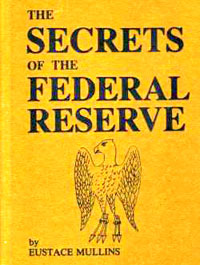
The Secrets of the Federal Reserve
Eustace Mullins
While I was reading "The Secrets of the Federal Reserve" by Eustace Mullins, I ran into a curious quote by William Jennings Bryan saying that he "regretted" his work which led to the creation of the Federal Reserve. Sounds like a powerful quote and I want to use it for anti-Federal Reserve activism. I decided I better verify the quote first and thankfully I did.
Here is the statement in the book:
Woodrow Wilson and Carter Glass are given credit for the Act by most contemporary historians, but of all those concerned, Wilson had least to do with Congressional action on the bill.
George Creel, a veteran Washington correspondent, wrote in
Harper’s Weekly, June 26, 1915:
"As far as the Democratic Party was concerned, Woodrow Wilson was without influence, save for the patronage he possessed. It was Bryan who whipped Congress into line on the tariff bill, on the Panama Canal tolls repeal, and on the currency bill." Mr. Bryan later wrote, "That is the one thing in my public career that I regret--my work to secure the enactment of the Federal Reserve Law."
The first part is true about Mr. Bryan, but the underlined part is the falsehood. William Jennings Bryan never said it nor did Eustace Mullins' source (George Creel - Harper's Weekly, June 26, 1915) say it.
Eustace Mullins falsified the quote. I'm very disappointed in you, Eustace!
If you want to read a better book exposing the Federal Reserve, I suggest "The Creature from Jekyll Island" by G. Edward Griffin.

The Creature from Jekyll Island: A Second Look at the Federal Reserve
- G. Edward Griffin
===
I'll post the article cited by Eustace Mullins. "The Commoner" by George Creel - Harper's Weekly, June 26, 1915.







 Reply With Quote
Reply With Quote
Connect With Us